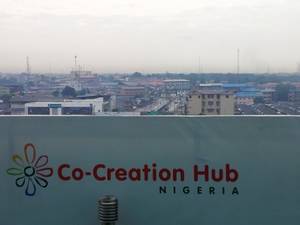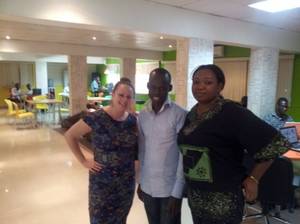Future Now
The IFTF Blog
Femi Longe on Designing Tech for Social Change
Part I
In July of 2012, I spent a few days around the Co-Creation Hub in Lagos, Nigeria. The CcHUB, or simply, the Hub, is the hottest, newest, co-creation, co-working, and innovation hub. Since it opened in September of last year, it is abuzz with young energy and brilliant entrepreneurs.
On my final day in Lagos I sat down with co-Founder and Director of Programmes at the CcHUB, Femi Longe, to hear more about how it all happens.

While the Hub officially opened in September of 2011, the co-founders were busy trying to affect change in their native Nigeria long before then. Beginning in January of 2011, they started running Open Living Labs—weekends where mixed stakeholders get together in order to find tech based solutions to particular Nigerian problems—out of the PanAfrican University. These Labs eventually led to the creation of the Hub, a space designed to more effectively nurture Nigerian entrepreneurs who want to make positive changes in their own country.
Within the Hub there appears to be two major pathways towards launching start-ups. The CcHUB still organizes Open Living Labs on a regular basis, but now can offer its space as a co-working office for young and passionate engineers, designers, and entrepreneurs. The barrier to entry is especially low to encourage a wider array of members. With an annual membership of only $200, they have about 500 members, and about 70 - 80 members use the space regularly. In addition to mentorship, members of the Hub regularly access training sessions. While I was there Blackberry held a 3-day mobile app development session. There were maybe 20-30 people in attendance.
The Hub has an elaborately built system for moving from ideation of a new solutions, to incubation, and finally to launch. The stages of creation are demarcated inside the Hub with color coded tables and chairs. In this way, young entrepreneurs just beginning to think about the solutions they want to create will be sharing a table with individuals in a similar situation. I had no idea this system was in place until about an hour before I left. It felt like stepping into a beehive where every member is in a particular area based on some logical design that is totally unobservable to an outsider.
For now the Hub is focused on the early stage of "I have an idea" -- they want entrepreneurs to see their work in terms of a project, not as a business. As Femi stated, Silicon Valley has been successful, in part, because people can focus on adding value initially, as opposed to obsessing over how their idea is going to generate revenue. I asked Femi if it make sense to have a system in which organizations can earn such a large amount of money without first having a revenue stream, I, of course, pointed to Facebook's recent IPO and Instagram's hefty price. Femi was quick to point out that Facebook provides a HUGE service to the world, and if Zuckerberg had to stop and think about revenue—much like Google in the early days—from the onset of the project, we would never have benefited from Facebook’s existence. And I guess this is the point that is easy to miss for those of us in the US that often see Facebook as a distraction. In other areas of the world Facebook has been a means to a level of civic engagement and organizing that was previously impossible. Facebook, Google, Twitter, all these organizations have allowed people to express themselves and be heard like never before!

Open Living Labs:
The Labs are meant to be experimental. They—along with the Hub as a whole—are meant to be a safe space for people to fail, but at the same time designed to limit needless failures. The Hub wants to put the resources in place—like knowledge partners, funding sources, and even end user testing—for success, but also create an atmosphere that promotes experimentation without fear of failure. Since the Hub opened less than a year ago, they have hosted 8 labs, and out of those labs, 15 start-ups (or solutions) are being developed. There are an additional 7 solutions being developed in the Hub from outside of the Labs as well.
During the Open Living Lab weekends participants will suggest tech-based solutions to the specific issue in focus, build a physical prototype, and design a business model. All this happens within 48 hours—from ideation, to prototype, and business model. Often times the Labs come with financial backing to help build and launch winning ideas. But instead of simply giving money directly to the winner, the Hub acts as an intermediary and co-creates the app alongside the Lab winner.
I asked Femi if there is a reason why solutions are only tech-based, acknowledging that some problems cannot be solved with technology. He quickly explained that this is simply the best way to reach a majority of Nigerians. The Hub is trying to leverage the fact that most Nigerians have mobiles, and Internet costs are dropping. Of course there is also the benefit that you can actually build a prototype for mobile and web-based solutions in a weekend, and the cost of starting up such businesses is relatively low.
The current focus on tech-based solutions does not mean that the Hub intends to stay purely tech-based forever. They are very flexible in their methodology, but are very certain about the end game. As Femi put it, the Hub wants to build a world in which, when the average Nigerian sees a problem, they know that they have the capacity and the resources they need to solve that problem. And perhaps what's most striking about the Hub is that the young (primarily male) members who spend their days there truly seem to be mostly average Lagosians.
Stay tuned for Part II



